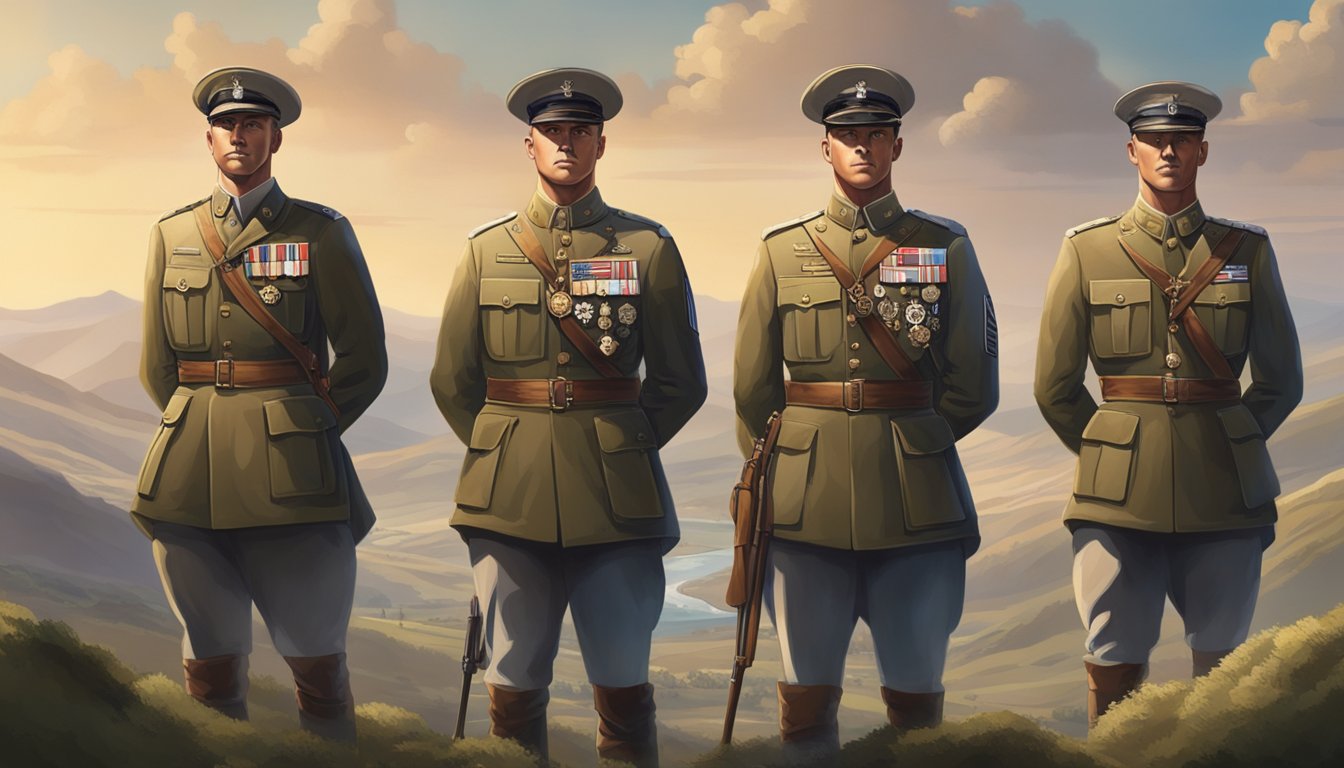The Victoria Cross, established by Queen Victoria in 1856, has recognized extraordinary bravery from individuals around the globe.
Among its recipients are five remarkable men born in America, who earned this prestigious medal while serving in the British military.
William Henry Harrison Seeley
The first of these heroes, William Henry Harrison Seeley, hailed from Topsham, Maine.
Aged 22 and seeking a new direction amid family tensions, Seeley left his life aboard a merchant ship in Boston to join the Royal Navy.
He served on the warship Impérieuse during the tumultuous Taiping Rebellion in China.
In 1862, Seeley moved to the frigate Euryalus, where he participated in a coalition operation against Japanese daimyo Mori Takachika, known for his assaults on European shipping in the Straits of Shimonoseki.
On September 5, 1864, during a reconnaissance mission, Seeley spotted a fortified enemy position.
Despite being wounded by grapeshot, he courageously conveyed vital information to 1st Lieutenant Frederick Edwards.
In a remarkable act of heroism, Seeley later rescued a severely injured captain, John Hobhouse Inglis Alexander, carrying him a quarter-mile to safety.
For his extraordinary courage, Seeley received the Victoria Cross on September 22, 1865.
He returned to Massachusetts, where he lived until his passing on October 1, 1914.
When Seeley passed away, World War I was underway in Europe, involving both the British Empire and eventually the United States.
This conflict created opportunities for four more Americans, who served under Canadian flags, to receive Britain’s highest military honor.
Honoring the Valor of George Harry Mullin
Among this next group, George Harry Mullin from Portland, Oregon, made his mark.
Born on August 15, 1891, Mullin moved to Saskatchewan as a toddler.
Inspired by his background, he enlisted in the Canadian Expeditionary Force in December 1914, joining the scout and sniper unit of Princess Patricia’s Canadian Light Infantry.
His bravery shone through during the capture of Vimy Ridge in April 1917, earning him a Military Medal after two years of relentless trench warfare.
In the chaotic battles surrounding Passchendaele in July 1917, Mullin stood out even more.
On October 30, while under heavy enemy fire, he courageously stormed a fortified position that had been severely harming his battalion.
He charged into a sniper’s lair, used explosives to dismantle the enemy forces, and climbed atop the structure to neutralize two machine gunners.
Soon after, he compelled ten enemy soldiers to surrender, an act that saved countless lives and resulted in a successful mission.
Mullin later served as a lieutenant, returned to civilian life in Moosomin, married, and had four children.
He also contributed to World War II as a captain in the Veterans’ Guard before retiring as a major.
He passed away on April 5, 1963, and rests in Moosomin, with his Victoria Cross proudly displayed at the Museum of the Regiments in Calgary, Alberta.
The Final Three Recipients
Three other American-born soldiers received the Victoria Cross while serving in the Canadian Expeditionary Force in 1918.
Raphael Louis Zengel, a November 11, 1894, native of Faribault, Minnesota, moved to Canada with his mother shortly after birth.
He enlisted in 1915 with the 5th Battalion of the 2nd Brigade, 1st Canadian Division.
During a trench raid near Passchendaele, Zengel displayed leadership when his commander fell, earning him a Military Medal by March 1918.
On August 9, 1918, while advancing near Warvillers, Zengel spotted a German machine gun nest that had created a significant gap in their formation.
Without hesitation, he sprinted across 200 yards of open ground, eliminated two enemy combatants, and rallied his battalion to continue advancing.
For this act of bravery, he received the Victoria Cross from King George V at Buckingham Palace on December 13, 1918.
Following the war, Zengel served in the Calgary Fire Department and contributed to the home front during World War II, retiring as a sergeant major.
He passed away on February 27, 1977, and was laid to rest in Alberta.
William Henry Metcalf, born on January 29, 1894, in Talmadge, Maine, also earned the Victoria Cross on the same day as Zengel.
After joining the Canadian Expeditionary Force on September 23, 1914, he found himself in France the following month, eventually serving as a corporal in the 16th Manitoba Regiment.
Metcalf endured numerous brutal battles, including Ypres, the Somme, and Passchendaele, all while holding a Military Medal and bar.
In a decisive moment on September 2, 1918, at Cangicourt, he directed a British tank into enemy strongpoints, skillfully using a signal flag to guide it despite suffering from multiple wounds.
He persevered, continuing to lead until the enemy defenses fell, before finally seeking medical attention.
Following nine months of hospitalization, Metcalf was awarded the Victoria Cross.
After the war, he returned to Maine, where he worked as a garage mechanic until his death on August 8, 1968, fulfilling his wish to be buried overlooking the St. Croix River toward Canada.
On that same fateful day, Bellenden Seymour Hutcheson—a medical officer born on December 16, 1883—also received the Victoria Cross.
After studying at Northwestern University Medical School, Hutcheson married a Nova Scotian and willingly renounced his American citizenship in order to enlist in the Canadian Expeditionary Force on December 14, 1915.
During the critical British offensive on August 8, 1918, Hutcheson undertook the risky task of evacuating injured soldiers.
On September 2, while with the 75th Battalion during an attack on Dury, he displayed remarkable bravery by rescuing numerous wounded individuals, including a gravely injured officer, enlisting the help of both British and captured German troops in the process.
For his selfless actions, Hutcheson received the Victoria Cross on December 14, 1918.
He later regained his American citizenship and resumed his medical practice in Illinois, passing away on April 9, 1954, and resting in the area.
These five courageous individuals embody the spirit of valor and dedication.
Their legacies serve as a beacon of inspiration for generations to come.
Source: Militarytimes

